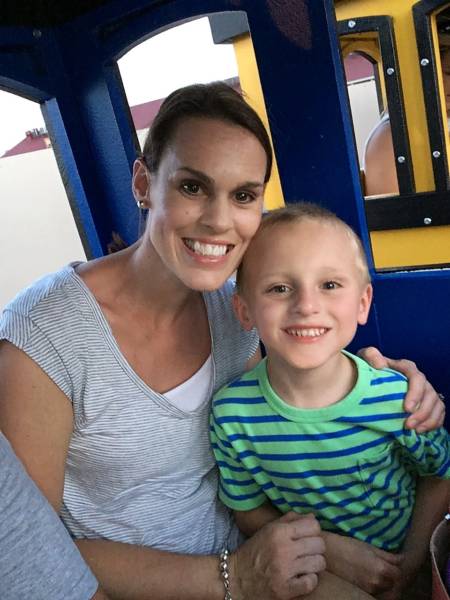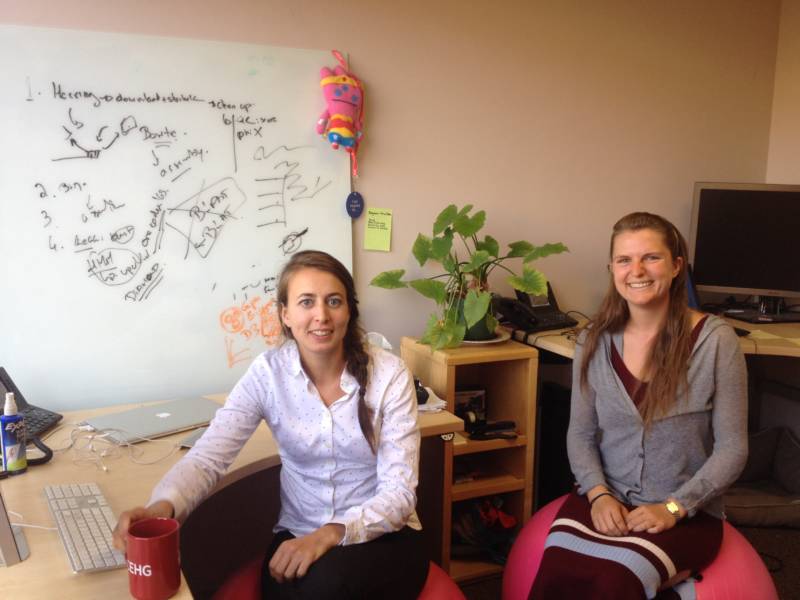This spring the White House announced a major new initiative to coordinate the study of these all-important bugs, including funding of about a half-billion dollars from the federal government and scores of universities, nonprofits and business.
"The microbiome is the hot thing to study now," says Kevin Becker, a researcher at the National Institutes of Health. "But I think that's exciting; the research is very robust."
Link to Autism
In 2007, Becker was the first researcher to suggest that the microbiome might be connected to symptoms of autism spectrum disorder. In the decade since, researchers have accumulated more evidence that the gastrointestinal tracts of children with ASD are often different. Depending on the survey, 60 to 90 percent have irritable bowel syndrome or have complained of diarrhea, stomachaches or gluten intolerance, which inflames the gut. For example, a study of 150 children published in 2006 found that 70 percent of kids with ASD suffered from gastrointestinal woes, compared to 42 percent of developmentally disabled children and 28 percent of children with no developmental disorder.
A study published in Cell in 2013 studied lab mice with ASD-like symptoms, such as avoiding social interaction and compulsive and repetitive behavior. Remarkably, after subjecting the mice to the human Bacteroides fragilis, the researchers noted the mice became less anxious and more social. The findings, wrote the authors, "support a gut-microbiome-brain connection in ASD and identify a potential probiotic therapy for GI and behavioral symptoms of autism."
"I read that and thought, 'OK there is something going on here!'" says David. "We just need a study with sufficient power to figure out what's going on in humans."
A few months later she began working with Wall, an autism and bioinformatics expert, on a project that would answer a key question: What is the connection between bacteria in the gut and autism in children?
The researchers reached out through social media for families with at least two children under eight who eat the same things but who differ in that at least one is free of ASD. The families—280 have signed up thus far—send in a two- to three-minute video of their kids, saliva and stool samples, and answers to a questionnaire about behavior and diet. In return, the families will receive the results (which the team cautions should not be used for diagnosis).
By sampling kids from the same families, the researchers are able to control for some of the factors that contribute to differences in children's gut flora, such as diet and home environment. Because the study allows for participation by subjects who never have to leave their homes, it has attracted more participants than is typical of such studies.
At Home With Autism
One family in the study lives in Pittsburgh. Kim is a busy mother whose days pass in a whirl. She has three five-year-olds: triplets Allie, Hunter and Jake. The kids love playing hide-and-seek. Allie likes dolls and princesses. If anything happens to upset her brothers, she becomes protective. Hunter likes superheroes, and Jake is into cars and trains.
"Jake is the wild man," says Kim. "He just wants to run and see what trouble he can get into."
Jake is the only one of the siblings with autism. And practically since birth, his mom says, he's had more stomachaches and gastrointestinal problems.
Even before participating in the autism study, Kim took steps to improve Jake's diet and gut health, which she believes have helped his symptoms. With fewer intestinal woes, Jake became calmer, less aggressive and more cheerful, she says.
When she came across a notice for the Autism Microbiome project on Facebook, she was immediately intrigued. She appreciated the change in focus from most of the research on the disorder.
"I think it's really ahead of the times," she says. "A lot of people look at autism and think of it as a psychological disease, and I think of it as more medical. So anything that supports the medical community looking at autism research in a different way, I want to be part of."
After she signed up, filled out the questionnaire and sent in the requested videos, a sampling kit arrived at her door a few weeks later.
"My hope is that this is going to be a way to help children in the future," she says.
'A Bit More Complex'
Now that enough samples have been returned from families like Kim's, researchers at the Wall lab have started looking at the early results.
In the first phase of their work, David, Tataru, Wall and a fourth member of the team, clinical coordinator Jena Daniels, are analyzing sequences from the stool samples and looking for similarities and differences in what bacteria are present, how abundant they are and what the community of gut bacteria look like.
"We were hoping to find something clear and simple, such as this bacteria signals autism" says Tataru. "Turns out, it's a bit more complex than we were expecting."
There are no immediately clear distinctions by type or number between the microbiomes of children with autism and those without. The researchers are, however, detecting some subtle differences. Kids within families are the most similar to each other. But kids with ASD in different families have microbiomes that are more alike than the microbiomes of non-autistic children in different families.
It's an interesting finding, even if the researchers are not sure what to make of it yet. As a 2014 review of the emerging data on the subject said, “The field is at a stage where more questions than answers are being generated.” And even some leading scientists involved in microbiome research have cautioned patients and their families not to get ahead of the research in looking for easy answers.
But for scientists like Kevin Becker at the NIH, who is not involved in the project, the turn toward the microbiome in researching ASD is a positive development. "Genetics has been the focus for a long time and it often dominates the discussion," he says. "Most autistic cases have no known genetic cause. Looking into these other paths is a welcome change."


